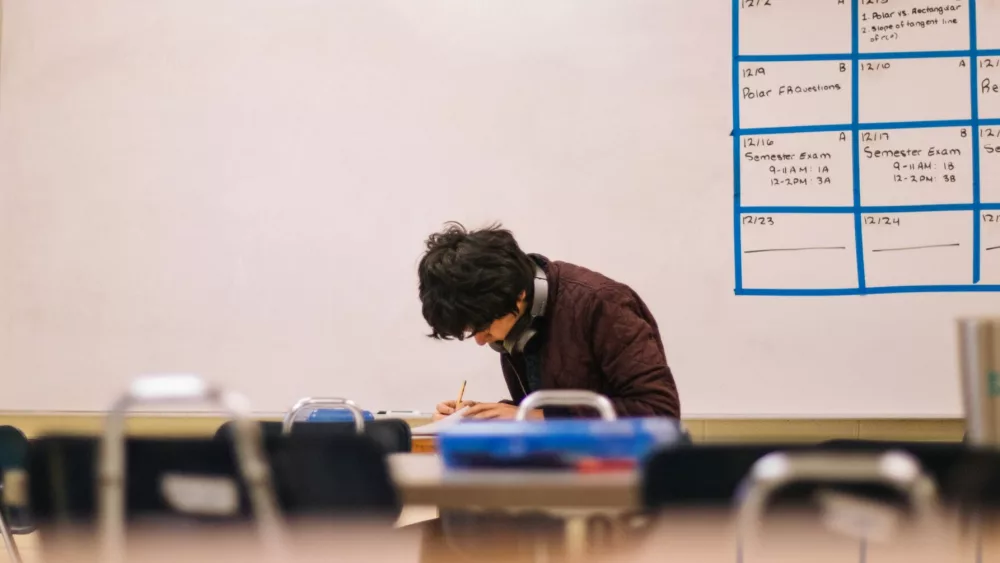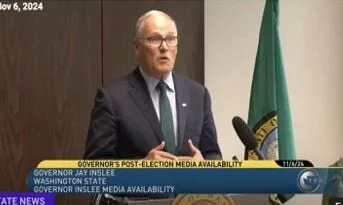(The Center Square) – Washington Gov. Jay Inslee delivered his 11th and final state-of-the-state address Tuesday before a joint session of the WA Legislature.
“We will always be the strongest state in the nation; in fact, the state of our state is stronger than ever,” Inslee said as he opened his midday speech.
The governor touted many accomplishments, including the increase in the state minimum wage while he’s been in office.
The minimum wage has increased from just over $9.00 an hour in 2013, when Inslee took office, to more than $16 an hour today.
Inslee’s largest accomplishment to date, though being challenged by citizen initiative, is the passage of the Climate Commitment Act. (CCA)
It requires large polluters, including big oil companies to offset their carbon emissions by paying at auction basically for the ‘right to pollute’, with a goal to encourage those companies to invest in cleaner fuels.
In the GOP response to Inslee’s address, Sen. Drew Stokesbary, R-Auburn-Enumclaw, immediately countered Inslee’s speech. “I think that’s understandable as it’s his record on trial, and I don’t think it’s a particularly good record.” He continued, “He (Inslee) said our state of the state is stronger than ever, I think the statistics belie that.”
Senator John Braun R-Centralia said, “Whether it’s food, gas, housing and wages not keeping up with inflation and not keeping up with regulatory changes making it more expensive.”
He added, “The Climate Commitment Act…it’s very obvious most folks can’t afford electric cars and when they show up at the gas station they have to pay another 50(cents) per gallon, it’s plain as day, the only difference is the Climate Commitment Act.”
Rep Mary Dye, R-Pomeroy, the ranking minority member of the House and Energy Committee, tells The Center Square, “Unless we do substantive reform and repeal (of the CCA) in a way that changes the design of the program, we’ll continue to burden homeowners and those who have to pay power bills because the impact of this goes across every aspect of our economy.” She continued, “It fundamentally transforms the way we ‘do’ economy, as the value of our every dollar is based on energy, because it’s our capacity to produce.”
Dye said, “We’re choosing infrastructure that is more expensive and decommissioning what was not useful at the end of its useful life. It’s expensive to do that and we’re expecting taxpayers and industry and ever economy to bare that burden.”
Beyond the climate agenda, Rep. Stokesbary continued, “We have the fewest police officers per capita in the nation, we are between number 1-and-3 for violent crime, property crime, auto theft.”
As is traditional during a state or federal annual address, Inslee brought guests to tout successes and promote his agenda, including efforts to recruit more law enforcement officers at the state and local level including a newly commissioned officer from the Tri-Cities.
Washington state lost hundreds of police officers during the defund movement following the murder of George Floyd and the months of protests and riots that followed. Many in law enforcement also left as a result of the COVID-19 vaccine requirements.
Inslee said his supplement budget includes funding for law enforcement recruiting efforts. He invited a recent Pasco Police Department hire, Claudia Fuentes, to highlight a new regional police training academy in the Tri-Cities.
“Claudia would not be an officer today if this legislature had not invested in more criminal justice training centers, like the one in Pasco.” He added, “It’s impossible for a parent to spend four-and-a-half months away from home for training like she would have had to have done. But because we invested in these training centers, Officer Fuentes got to go home at night. Thank you, Officer Fuentes.”
The governor did draw applause from both aisles when he promoted giving 32,000 paraeducators in our state a raise of $3 an hour. Inslee said the goal is “Raising the cap on special education funding and creating incentives for more teachers to serve special needs students.”





